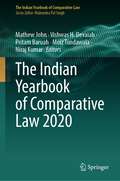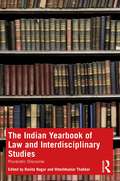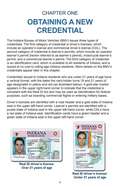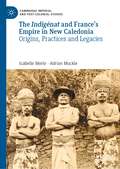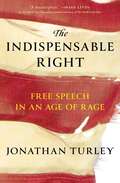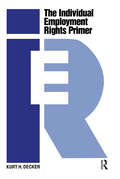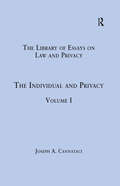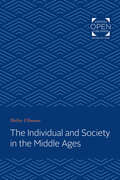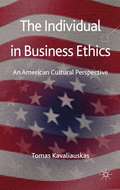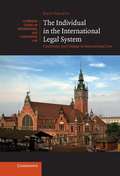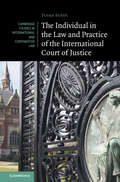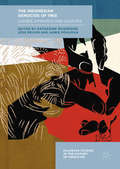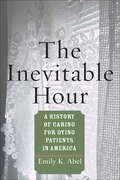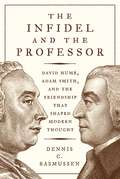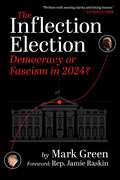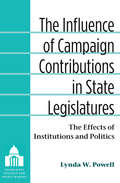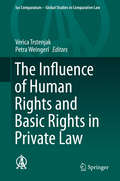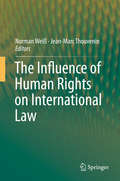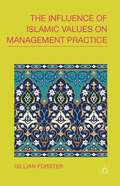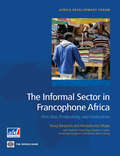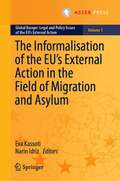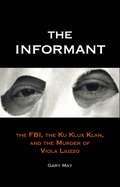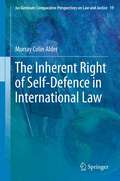- Table View
- List View
The Indian Yearbook of Comparative Law 2020 (The Indian Yearbook of Comparative Law)
by Niraj Kumar Vishwas H. Devaiah Mathew John Pritam Baruah Moiz TundawalaThis yearbook is a compilation of thematically arranged essays that critically analyse emerging developments, issues, and perspectives in the field of comparative law. It comprises three parts wherein the first part focuses on public law and its related issues, the second part engages with issues in the field of private law, and the third part discusses general themes in comparative law. The yearbook includes papers on comparative study between universalism and Asian exceptionalism under human rights perspective, reclaiming the German concept of the rule of law “Rechtsstaat”, the Guarantee Clause in global constitutionalism, administrative justice, constitution and culture, and the category of the ’stranger’ in modern legal and political thought. The Yearbook touches upon various issues, e.g., forest protection and the idea of Justice, the application of defamation law on politicians, the intersection of customary law relating to child marriage in different countries, hybrid statehood and Buddhist nationalism. Further, scholarly work on the themes of comparative law, customary law, environmental law, and constitutional law is also highlighted.The yearbook intends to seamlessly tie together discussions on both public and private law aspects of comparative law. It encourages readers to gain a nuanced understanding of the working of the law, legal systems and legal cultures while aiding deliberations on the constituents of an ideal system of law.
The Indian Yearbook of Law and Interdisciplinary Studies: Pluralistic Discourse
by Ranita Nagar Hiteshkumar ThakkarThis yearbook focuses on law and its interdisciplinarity in India. It brings together scholars of law, economics, and policy to foster multidisciplinary thinking and analysis across subject areas. The contributors to this volume embody an interdisciplinary spirit through their academic experience and aim to bring to the fore unique suggestions for a better understanding of the law. The volume explores various key issues that are central to state policy demanded by a functioning democracy, in terms of democratic quality, aspirations and sustainability. It discusses global and social issues, such as foreign interference in domestic elections, feminism, and climate change and looks at other subjects such as economics, religion, history, literature from the perspective of law. A unique contribution to the study of law in India, this book will be an essential read for scholars and researchers of law, jurisprudence, political science, economics, public policy, sociology, social anthropology, the Indian Constitution, and South Asia studies.
The Indiana Driver's Manual
by Indiana Bureau of Motor VehiclesThe Indiana Bureau of Motor Vehicles (BMV) issues three types of credentials. The first category of credential is driver’s licenses, which include an operator’s license and commercial driver’s license (CDL). The second category of credential is learner’s permits, which include an operator learner’s permit (herein referred to as learner’s permit), motorcycle learner’s permit, and a commercial learner’s permit. The third category of credential is an identification card, which is available to all residents of Indiana, and is issued at no cost to voting-age Indiana residents. More details on the BMV’s credentials appear later in this chapter.
The Indigénat and France’s Empire in New Caledonia: Origins, Practices and Legacies (Cambridge Imperial and Post-Colonial Studies)
by Isabelle Merle Adrian MuckleThis book provides a long history of France’s infamous indigénat regime, from its origins in Algeria to its contested practices and legacies in France’s South Pacific territory of New Caledonia. The term indigénat is synonymous throughout the francophone world with the rigours and injustices of the colonial era under French rule. The indigénat regime or 'Native Code' governed the lives of peoples classified as French 'native' subjects in colonies as diverse as Algeria, West Africa, Madagascar, Indochina and New Caledonia. In New Caledonia it was introduced by decree in 1887 and remained in force until Kanak — New Caledonia’s indigenous people — obtained citizenship in 1946. Among the colonial tools and legal mechanisms associated with France’s colonial empire it is the one that has had the greatest impact on the memory of the colonized. Focussing on New Caledonia, the last remaining part of overseas France to have experienced the full force of the indigénat, this book illustrates the way that certain measures were translated into colonial practices, and sheds light on the tensions involved in the making of France as both a nation and a colonial empire. The first book to provide a comprehensive history of the indigénat regime, explaining how it first came into being and survived up until 1946 despite its constant denunciation, this is an important contribution to French Imperial History and Pacific History.
The Indispensable Right: Free Speech in an Age of Rage
by Jonathan TurleyA &“timely and brilliant original&” (Michael B. Mukasey, former US attorney general) look at freedom of speech—our most basic right and the one that protects all the others.Free speech is a human right, and the free expression of thought is at the very essence of being human. The United States was founded on this premise, and the First Amendment remains the single greatest constitutional commitment to the right of free expression in history. Yet there is a systemic effort to bar opposing viewpoints on subjects ranging from racial discrimination to police abuse, from climate change to gender equity. These measures are reinforced by the public&’s anger and rage; flash mobs appear today with the slightest provocation. We all lash out against anyone or anything that stands against our preferred certainty. The Indispensable Right places the current attacks on free speech in their proper historical, legal, and political context. The Constitution and the Bill of Rights were not only written for times like these, but in a time like this. This country was born in an age of rage and for 250 years we have periodically lost sight of the value of free expression. The history of the struggle for free speech is the story of extraordinary people—nonconformists who refuse to yield to abusive authority—and here is a mosaic of vivid characters and controversies. Johnathan Turley &“has written a learned and bracing book, rigorously detailed and unfailingly evenhanded&” (The Wall Street Journal) showing us the unique dangers of our current moment. The alliance of academic, media, and corporate interests with the government&’s traditional wish to control speech has put us on an almost irresistible path toward censorship. The Indispensable Right is a &“magnum opus should be required reading for everyone who cares about free speech&” (Nadine Strossen, former president of the American Civil Liberties Union) that reminds us that we remain a nation grappling with the implications of free expression and with the limits of our tolerance for the speech of others. For rather than a political crisis, this is a crisis of faith.
The Individual Employment Rights Primer
by Kurt H. DeckerA guide to employment law. One of the most rapidly evolving areas of law involves individual employment rights. Individual employment rights has no clearly defined boundary. It encompasses a multitude of employment statutes and court decisions. It finds its support in constitutional law and has developed as part of specialized employment law areas involving record keeping and disclosure, labor relations, health and safety, labor standards, fair employment practices. This book consolidates these fragmented individual employment rights into a centralized reference source.
The Individual and Privacy: Volume I (The Library of Essays on Law and Privacy)
by Joseph A. CannataciThe essays selected for this volume reflect the many paths followed to develop a new, more robust methodology (idMAPPING) for investigating privacy. Each article deals with the three dimensions of time, space and place by addressing a number of questions such as: who? Which individual? When? How? Is privacy viewed from the perspective of legal theory, or of information science? Or from the viewpoint of sociology, social psychology, philosophy, information ethics or data protection law? The reader is offered a multi-disciplinary overview of the subject, a mosaic made up of several snapshots taken at different times by different scholars with different points of view. The detailed introduction increases clarity in parts of the picture where the way that the pieces fit together may not be immediately apparent, and concludes by challenging internet-era fallacies. Taken together, the articles demonstrate an innovative approach to evidence-based policy-making, and show privacy scholarship at its best.
The Individual and Society in the Middle Ages
by Walter UllmannOriginally published in 1966. The Individual and Society in the Middle Ages, based on three guest lectures given at Johns Hopkins University in 1965, explores the place of the individual in medieval European society. Looking at legal sources and political ideology of the era, Ullmann concludes that, for most of the Middle Ages, the individual was defined as a subject rather than a citizen, but the modern concept of citizenship gradually supplanted the subject model from the late Middle Ages onward. Ullmann lays out the theological basis of the political theory that cast the medieval individual as an inferior, abstract subject. The individual citizen who emerged during the late Middle Ages and the Renaissance, by contrast, was an autonomous participant in affairs of state. Several intellectual trends made this humanistic conception of the individual possible, among them the rehabilitation of vernacular writing during the thirteenth century and the growing interest in nature, natural philosophy, and natural law. However, Ullmann points to feudalism as the single most important medieval institution that laid the groundwork for the emergence of the modern citizen.
The Individual in Business Ethics: An American Cultural Perspective
by Tomas KavaliauskasToday we are witnessing social and political dominance of large corporations. They provide for its employees moral values and business principles. Moreover, they institutionalize their codes of ethics. The theory of Business Ethics provides the moral guideline and standards for corporate life and concrete business organizations apply those standards to practice. The individual employee, as a member of a business organization, accepts those standards. Therefore, it is important to examine the foundation of the individual's moral value in Business Ethics in order to understand on what the foundation of the moral value depends on. This highly interdisciplinary text is a critique of Business Ethics as an ideology and life politics. The author discloses how contemporary business ethics grovels before corporations, how it is too weak to create a truly critical voice of American capitalist economy. The individual's treatment in corporate life is revealed through the eyes of American Protestant culture and its coercive work tradition where efficiency value usurps values of individual choice and freedom. This book suggests a new concept of an out-corporate individual.
The Individual in the International Legal System
by Kate ParlettKate Parlett's study of the individual in the international legal system examines the way in which individuals have come to have a certain status in international law, from the first treaties conferring rights and capacities on individuals through to the present day. The analysis cuts across fields including human rights law, international investment law, international claims processes, humanitarian law and international criminal law in order to draw conclusions about structural change in the international legal system. By engaging with much new literature on non-state actors in international law, she seeks to dispel myths about state-centrism and the direction in which the international legal system continues to evolve.
The Individual in the Law and Practice of the International Court of Justice (Cambridge Studies in International and Comparative Law)
by Yusra SuediThe cornerstone of the World Court's identity is its resolution of inter-state disputes. This insightful critique challenges the implication that individuals have little importance in such disputes as a result. Arguing for individuals' enhanced integration, it reveals their relevance in a myriad of disputes beyond those centred on violations of multilateral human rights treaties and unveils a multitude of procedural practices with unquenched potential. It also carefully unpacks and interrogates the Court's legal reasoning in various contexts such as territorial and maritime disputes, amongst others. Finally, it critically analyses and evaluates the legal and political underpinnings for the Court's approaches and state litigants' choices from a lens of social idealism. This pioneering study sheds light on the imbalance between individuals as key stakeholders in inter-state disputes and their treatment in law and practice.
The Indoctrination of the Wehrmacht: Nazi Ideology and the War Crimes of the German Military
by Bryce SaitFar from the image of an apolitical, “clean” Wehrmacht that persists in popular memory, German soldiers regularly cooperated with organizations like the SS in the abuse and murder of countless individuals during the Second World War. This in-depth study demonstrates that a key factor in the criminalization of the Wehrmacht was the intense political indoctrination imposed on its members. At the instigation of senior leadership, many ordinary German soldiers and officers became ideological warriors who viewed their enemies in racial and political terms—a project that was but one piece of the broader effort to socialize young men during the Nazi era.
The Indonesian Genocide of 1965: Causes, Dynamics And Legacies (Palgrave Studies in the History of Genocide)
by Katharine McGregor Jess Melvin Annie PohlmanThis collection of essays by Indonesian and foreign contributors offers new and highly original analyses of the mass violence in Indonesia which began in 1965 and its aftermath. Fifty years on from one the largest genocides of the twentieth century, they probe the causes, dynamics and legacies of this violence through the use of a wide range of sources and different scholarly lenses. Chapter 12 of this book is available open access under a CC BY 4.0 license at link.springer.com.
The Inevitable Hour: A History of Caring for Dying Patients in America
by Emily K. AbelChanges in health care have dramatically altered the experience of dying in America.At the turn of the twentieth century, medicine’s imperative to cure disease increasingly took priority over the demand to relieve pain and suffering at the end of life. Filled with heartbreaking stories, The Inevitable Hour demonstrates that professional attention and resources gradually were diverted from dying patients. Emily K. Abel challenges three myths about health care and dying in America. First, that medicine has always sought authority over death and dying; second, that medicine superseded the role of families and spirituality at the end of life; and finally, that only with the advent of the high-tech hospital did an institutional death become dehumanized. Abel shows that hospitals resisted accepting dying patients and often worked hard to move them elsewhere. Poor, terminally ill patients, for example, were shipped from Bellevue Hospital in open boats across the East River to Blackwell’s Island, where they died in hovels, mostly without medical care. Some terminal patients were not forced to leave, yet long before the advent of feeding tubes and respirators, dying in a hospital was a profoundly dehumanizing experience.With technological advances, passage of the Social Security Act, and enactment of Medicare and Medicaid, almshouses slowly disappeared and conditions for dying patients improved—though, as Abel argues, the prejudices and approaches of the past are still with us. The problems that plagued nineteenth-century almshouses can be found in many nursing homes today, where residents often receive substandard treatment. A frank portrayal of the medical care of dying people past and present, The Inevitable Hour helps to explain why a movement to restore dignity to the dying arose in the early 1970s and why its goals have been so difficult to achieve.
The Infidel and the Professor: David Hume, Adam Smith, and the Friendship That Shaped Modern Thought
by Dennis C. RasmussenThe story of the greatest of all philosophical friendships—and how it influenced modern thoughtDavid Hume is widely regarded as the most important philosopher ever to write in English, but during his lifetime he was attacked as “the Great Infidel” for his skeptical religious views and deemed unfit to teach the young. In contrast, Adam Smith was a revered professor of moral philosophy, and is now often hailed as the founding father of capitalism. Remarkably, the two were best friends for most of their adult lives, sharing what Dennis Rasmussen calls the greatest of all philosophical friendships. The Infidel and the Professor is the first book to tell the fascinating story of the friendship of these towering Enlightenment thinkers—and how it influenced their world-changing ideas.The book follows Hume and Smith’s relationship from their first meeting in 1749 until Hume’s death in 1776. It describes how they commented on each other’s writings, supported each other’s careers and literary ambitions, and advised each other on personal matters, most notably after Hume’s quarrel with Jean-Jacques Rousseau. Members of a vibrant intellectual scene in Enlightenment Scotland, Hume and Smith made many of the same friends (and enemies), joined the same clubs, and were interested in many of the same subjects well beyond philosophy and economics—from psychology and history to politics and Britain’s conflict with the American colonies. The book reveals that Smith’s private religious views were considerably closer to Hume’s public ones than is usually believed. It also shows that Hume contributed more to economics—and Smith contributed more to philosophy—than is generally recognized.Vividly written, The Infidel and the Professor is a compelling account of a great friendship that had great consequences for modern thought.
The Inflection Election: Democracy or Fascism in 2024?
by Mark GreenRep. JAMIE RASKIN (D-MD): &“This fine book is an essential primer about the stakes in &’24. We owe Mark a debt of gratitude.&”LAURENCE TRIBE: &“Written with searing clarity and biting humor.&” The Inflection Election: Democracy or Fascism in 2024? aims to warn busy and credulous Americans that this November will be a choice between a Party of Progress and a Party of Dangerous Extremism that may determine the path for American governance for generations. This is not a &“both-sides&” analysis by a journalistic spectator, but is instead a blunt &“one-sided&” guide by an experienced partisan—a public interest lawyer, elected Democrat, and prolific author. Mark Green makes the case for Democracy and Freedom and against Trump&’s blatant Caesarism and MAGA&’s fringeworthy agenda. While neither side has a prohibitive advantage as of mid-2024, the stakes are no mystery. If the GOP should now win both the White House and Congress—with a reactionary Supreme Court already in its column—a numerical minority of Americans would then enjoy a temporary governing majority that could cancel a century of progress and make the world&’s oldest democracy no longer democratic. There must be a word that binds together such threats but it sure isn't &“conservative&” in the way Eisenhower, Reagan, or the Bushes would have understood it. For if all the corruption, lies, violence, and racism described throughout The Inflection Election were aggregated into a pointillist painting, the portrait would resemble Orbán far more than Obama. This is extremism posing as patriotism . . . whether it&’s called fascism, dictatorship, autocracy, or authoritarianism. While the country can hope that the courts will hold Trump accountable, Green concludes that crushing it in 2024 is the best way to return to a healthy two-party system where losers respect the choice of voters, like in the good old days of 1789–2020. In a likely close 2024 national contest, The Inflection Election is an entertaining and informative manifesto that will become part of this year&’s urgent political conversation. It is a one-stop primer that synthesizes fresh phrases, narratives and values to keep Democrats on offense and Trump&’s MAGA party on-the-ropes. Green&’s conclusion is that the GOP &“sounds like a casting call for the delirious jury in the classic film Idiocracy, which was supposed to be a satire on reverse Darwinism, not reality TV.&” November 5, 2024 is either/or time. This book explains why.
The Influence of Campaign Contributions in State Legislatures: The Effects of Institutions and Politics
by Lynda W. PowellCampaign contributions are widely viewed as a corrupting influence but most scholarly research concludes that they have marginal impact on legislative behavior. Lynda W. Powell shows that contributions have considerable influence in some state legislatures but very little in others. Using a national survey of legislators, she develops an innovative measure of influence and delineates the factors that explain this great variation across the 99 U. S. state legislative chambers. Powell identifies the personal, institutional, and political factors that determine how much time a legislator devotes to personal fundraising and fundraising for the caucus. She shows that the extent of donors' legislative influence varies in ways corresponding to the same variations in the factors that determine fundraising time. She also confirms a link between fundraising and lobbying with evidence supporting the theory that contributors gain access to legislators based on donations, Powell's findings have important implications for the debate over the role of money in the legislative process.
The Influence of Human Rights and Basic Rights in Private Law
by Verica Trstenjak Petra WeingerlThis book provides a comparative perspective on one of the most intriguing developments in law: the influence of basic rights and human rights in private law. It analyzes the application of basic rights and human rights, which are traditionally understood as public law rights, in private law, and discusses the related spillover effects and changing perspectives in legal doctrine and practice. It provides examples where basic rights and human rights influence judicial reasoning and lead to changes of legislation in contract law, tort law, property law, family law, and copyright law. Providing both context and background analysis for any critical examination of the horizontal effect of fundamental rights in private law, the book contributes to the current debate on an important issue that deserves the attention of legal practitioners, scholars, judges and others involved in the developments in a variety of the world's jurisdictions. This book is based on the General Report and national reports commissioned by the International Academy of Comparative Law and written for the XIXth International Congress of Comparative Law in Vienna, Austria, in the summer of 2014.
The Influence of Human Rights on International Law
by Norman Weiß Jean-Marc ThouveninThis volume discusses the impact of human rights law on other fields of international law. Does international human rights law modify other fields of international law? Contributions focus on possible spillover effects of human rights on international economic or international criminal law. Does international human rights law have a streamlining effect on international law as a whole? This might be identified as a process of constitutionalisation. In this book, human rights can be understood as one of the core principles of international legal order and thus have an effect on the general law of treaties or on the settlement of disputes. Although human rights law is a relatively young field of international law, its content and core values today are of major importance for the interpretation of international law as a whole. As we witness a redefinition of sovereignty as a responsibility of states towards the people and a shift to greater relevance of the individual in international law in general, it is a logical consequence that human rights have an impact on other areas of international law.
The Influence of Islamic Values on Management Practice
by Gillian ForsterThe Influence of Islamic Values on Management Practice is a cultural study examining how Islamic values influence management practice. Using Morocco as a case study, and with academic research and actual business managers working in this context, the book explores and explains how national characteristics, including Islam, shape management practice
The Informal Sector in Francophone Africa
by Stephen S. Golub Ahmadou Aly Mbaye Birahim Bouna Niang Dominique Haughton Ibrahima Thione Diop Nancy BenjaminThe informal sector in West Africa has some distinctive characteristics. Informality usually connotes small and unorganized producers operating on the fringes of the formal economy. In West African countries, however, the normal situation is to some extent reversed: a dynamic informal sector dominates the stagnant formal economy. Moreover, in these countries, small operators coexist with very large and politically well-connected informal enterprises and well-organized networks. Notwithstanding its importance, there have been relatively few systematic studies of this dual feature of the informal sector in West Africa, and consequently too little is known about it. One of our hypotheses is that determinants and appropriate policy responses are likely to differ between "large" and "small" informal operations. This volume focuses on the urban informal sector in three capital cities: Dakar (Senegal), Cotonou (Benin) and Ouagadougou (Burkina Faso). These three countries have important differences and as a group, are quite representative of francophone West Africa and to a lesser extent West Africa as a whole. The authors use a mix of quantitative and qualitative approaches with data obtained from our new Bank surveys of 900 firms in the three cities, interviews with knowledgeable stakeholders and participants, and all available secondary data. For the surveys, the authors designed their sampling strategy to include three distinctive categories of firms: formal, small informal, and large informal. In addition, they developed a comprehensive definition of informality to reflect its complexity and heterogeneneity. The definition (Chapter 1) covers six components of informality, whereas previous definitions are generally limited to a binary classification based on one or two indicators. The results for West Africa corroborate many findings from earlier studies, particularly for small informal firms. In addition, the authors break new ground by shedding light on the large informal sector and the influence of institutional and socio-cultural factors in shaping the informal sector.
The Informalisation of the EU's External Action in the Field of Migration and Asylum (Global Europe: Legal and Policy Issues of the EU’s External Action #1)
by Eva Kassoti Narin IdrizThis contributed volume examines the trend whereby the EU resorts ever more often to informal arrangements and deals with third countries in an effort to curb and manage migration flows towards the EU and facilitate the return of irregular migrants to their countries of origin or transit. The perceived success of the EU-Turkey deal provided a strong impetus for the continuation of this trend. The contributions collected and presented in this book aim to shed light on the implications of this trend for the EU constitutional order, the human rights of those affected by these deals, the third countries with which the EU cooperates, and the global refugee protection regime. They demonstrate how these deals raise more issues than they solve; by, for instance, sidestepping established Treaty rules and procedures, violating the human rights of those affected, and overburdening the nascent migration and asylum systems of third country partners. This book, the first volume to appear in the Global Europe Series, will be of great interest to researchers and policy makers working in the field of migration and asylum.Eva Kassoti and Narin Idriz work in the Research Department of the T.M.C. Asser Institute in The Hague.
The Informant: The FBI, the Klu Klux Klan, and the Murder of Viola Luzzo
by Gary MayAn FBI&’s informant&’s role in the murder of a civil rights activist by the KKK is explored in this &“suspenseful and vigorously reported&” history (Baltimore Sun). In 1965, Detroit housewife Viola Liuzzo drove to Alabama to help organize Martin Luther King&’s Voting Rights March from Selma, Alabama, to Montgomery. But after the march&’s historic success, Liuzzo was shot to death by members of the Birmingham Ku Klux Klan. The case drew national attention and was solved almost instantly, because one of the Klansman present during the shooting was Gary Thomas Rowe, an undercover FBI informant. At the time, Rowe&’s information and testimony were heralded as a triumph of law enforcement. But as Gary May reveals in this provocative book, Rowe&’s history of collaboration with both the Klan and the FBI was far more complex. Based on previously unexamined FBI and Justice Department Records, The Informant demonstrates that in their ongoing efforts to protect Rowe&’s cover, the FBI knowingly became an accessory to some of the most grotesque crimes of the Civil Rights era—including a vicious attack on the Freedom Riders and perhaps even the bombing of the Sixteenth Street Baptist Church. A tale of a renegade informant and a tragically dysfunctional intelligence system, The Informant offers a dramatic cautionary tale about what can happen when secret police power goes unchecked.
The Inherent Right of Self-Defence in International Law
by Murray Colin AlderDetermining the earliest point in time at which international law authorises a state to exercise its inherent right of self-defence is an issue which has been debated, but unsatisfactorily reasoned, by scholars and states since the 1960's. Yet it remains arguably the most pressing question of law that faces the international community. This book unravels the legal and factual complications which have obscured the answer to this question. In contrast to most other works, it takes an historic approach by tracing the evolution of the rights, rules and principles of international law which have governed the use of force by states since the 16th century. Its emphasis on self-defence provides the reader with a new and complete understanding of how and why the international legal framework limits defensive force to repelling an imminent threat or use of offensive force which is directed at the territory of a state. Taking an historic approach enables this book to resurrect an understanding of the human defensive instinct which has guided the formation of the international law of self-defence. It also explains the true legal nature and scope of the inherent right of self-defence, of anticipatory self-defence and provides a definition of the legal commencement of an armed attack for the purpose of Article 51 of the Charter. Finally, the reader will receive a unique source of research materials and analysis of state practice and of scholarly works concerning self-defence and the use of force since the 16th century, which is suitable for all readers of international law around the world.
The Inheritor's Powder: A Tale of Arsenic, Murder, and the New Forensic Science
by Sandra HempelIn the first half of the nineteenth century, an epidemic swept Europe: arsenic poisoning. Available at any corner shop for a few pence, arsenic was so frequently used by potential beneficiaries of wills that it was nicknamed "the inheritor's powder. " But it was difficult to prove that a victim had been poisoned, let alone to identify the contaminated food or drink since arsenic was tasteless. Then came a riveting case. On the morning of Saturday, November 2, 1833, the Bodle household sat down to their morning breakfast. That evening, the local doctor John Butler received an urgent summons: the family and their servants had collapsed and were seriously ill. Three days later, after lingering in agony, wealthy George Bodle died in his bed at his farmhouse in Plumstead, leaving behind several heirs, including a son and grandson--both of whom were not on the best of terms with the family patriarch. The investigation, which gained international attention, brought together a colorful cast of characters: bickering relatives; a drunken, bumbling policeman; and James Marsh, an unknown but brilliant chemist who, assigned the Bodle case, attempted to create a test that could accurately pinpoint the presence of arsenic. In doing so, however, he would cause as many problems as he solved. Were innocent men and women now going to the gallows? And would George Bodle's killer be found?Incisive and wryly entertaining, science writer Sandra Hempel brings to life a gripping story of domestic infighting, wayward police behavior, a slice of Victorian history, stories of poisonings, and an unforgettable foray into the origins of forensic science.
